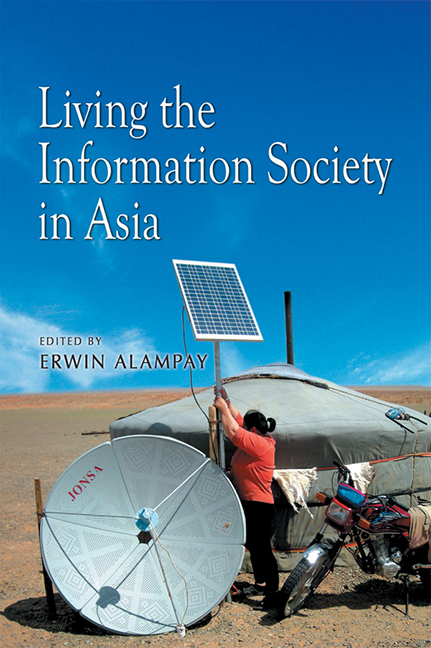Book contents
- Frontmatter
- Contents
- Foreword
- Preface
- List of Abbreviations
- Contributors
- Introduction: Perspectives of ICT Research in Asia
- 1 What Would Durkheim Have Thought? Living in (and with) the Information Society
- 2 What Is a Mobile Phone Relationship?
- 3 Technologies of Transformation: The End of the Social or the Birth of the Cyber Network?
- 4 Becoming Mobile in Contemporary Urban China: How Increasing ICT Usage Is Reformulating the Spatial Dimension of Sociability
- 5 Mobile Religiosity in Indonesia: Mobilized Islam, Islamized Mobility and the Potential of Islamic Techno Nationalism
- 6 Moral Panics and Mobile Phones: The Cultural Politics of New Media Modernity in India
- 7 Stories from e-Bario
- 8 Life and Death in the Chinese Informational City: The Challenges of Working-Class ICTs and the Information Have-less
- 9 Institutional Responses to GIS Adoption for RPTA in Local Governments
- 10 Customer Acquisition among Small and Informal Businesses in Urban India: Comparing Face-to-Face and Mediated Channels
- 11 The View from the Other Side: The Impact of Business Process Outsourcing on the Well-being and Identity of Filipino Call Centre Workers
- 12 Empowering Thai Homeworkers through ICTs
- Index
Preface
Published online by Cambridge University Press: 21 October 2015
- Frontmatter
- Contents
- Foreword
- Preface
- List of Abbreviations
- Contributors
- Introduction: Perspectives of ICT Research in Asia
- 1 What Would Durkheim Have Thought? Living in (and with) the Information Society
- 2 What Is a Mobile Phone Relationship?
- 3 Technologies of Transformation: The End of the Social or the Birth of the Cyber Network?
- 4 Becoming Mobile in Contemporary Urban China: How Increasing ICT Usage Is Reformulating the Spatial Dimension of Sociability
- 5 Mobile Religiosity in Indonesia: Mobilized Islam, Islamized Mobility and the Potential of Islamic Techno Nationalism
- 6 Moral Panics and Mobile Phones: The Cultural Politics of New Media Modernity in India
- 7 Stories from e-Bario
- 8 Life and Death in the Chinese Informational City: The Challenges of Working-Class ICTs and the Information Have-less
- 9 Institutional Responses to GIS Adoption for RPTA in Local Governments
- 10 Customer Acquisition among Small and Informal Businesses in Urban India: Comparing Face-to-Face and Mediated Channels
- 11 The View from the Other Side: The Impact of Business Process Outsourcing on the Well-being and Identity of Filipino Call Centre Workers
- 12 Empowering Thai Homeworkers through ICTs
- Index
Summary
There has been growing interest among people to understand how lives are changed by information and communication technologies (ICTs). In the early years of this century, we would occasionally read a paper on ICTs written from the perspective of our respective fields. Someone would present a paper on distance learning using the radio, while another would write about how texting is changing the nature of relationships. On occasion, there would be specialized conferences that dealt with e-commerce, e-government, and lately conferences on ICT and development. Slowly, but seemingly exponentially, the amount of research being done on the topic has increased.
It is apparent to scholars and researchers who are currently working on issues related to ICTs that just as there is growing interest and research, that these studies not only need to be known, but that each scholar or researcher can learn from each other, especially from those coming from other disciplines and geographic locations.
This was the reason why we put together the Philippine ICT Research group in 2006, informally to find out who was doing ICT research in the country. From the beginning, the primary movers of this group were Raul Pertierra, Erwin Alampay, Regina Hechanova, Czarina Saloma-Akpedonu, and Ranjit Rye. In our initial meetings, we hoped to organize a small conference to bring Filipino researchers together. However, events overtook us. Apparently, there was a demand for this kind of event from other researchers in Asia. We were also very fortunate to have found a partner in the International Development Research Centre (IDRC) who shared this interest.
This partnership lead to the first Living the Information Society conference that was held in Manila on 23–24 April 2007. The conference was co-hosted by the National College of Public Administration and Governance (NCPAG) of the University of the Philippines. The intent behind the conference was to bring together scholars and researchers with different disciplinary orientations (i.e. Sociology, Anthropology, Economics, Psychology, etc.) and doing research in different regions in Asia (e.g., India, China, Thailand, Korea, etc.). The objective was to learn about each other's work and encourage collaboration (i.e. cross-country; inter-disciplinary; multi-disciplinary).
- Type
- Chapter
- Information
- Living the Information Society in Asia , pp. ix - xPublisher: ISEAS–Yusof Ishak InstitutePrint publication year: 2009

